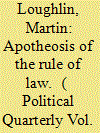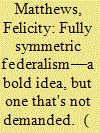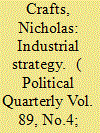|
|
|
Sort Order |
|
|
|
Items / Page
|
|
|
|
|
|
|
| Srl | Item |
| 1 |
ID:
162602


|
|
|
|
|
| Summary/Abstract |
Professor Alan Maynard applied both his wit and wisdom to the analysis of health care and health policy for over five decades. As a leading health economist, he made an immense contribution to the analysis and understanding of many of the key issues that are still at the heart of the current debates about the National Health Service. His academic interests were wide ranging, including health systems and reform, performance, workforce, regulation, public health and the pharmaceutical industry. Alan's natural ability to communicate with varied audiences established the relevance of health economics thinking and language to policy and practice, both nationally and internationally.
|
|
|
|
|
|
|
|
|
|
|
|
|
|
|
|
| 2 |
ID:
162596


|
|
|
|
|
| Summary/Abstract |
Gerrymandering has long characterised the electoral cartography of the United States and a sequence of cases seeking to outlaw the practice have all failed before the Supreme Court. Its judgement in a 2006 case indicated that although the Court recognised the practice, it could identify no formal means of evaluating whether any particular map of Congressional or State electoral districts was a gerrymander that violated a constitutional provision. This encouraged those who drew up new district maps in many states after publication of the 2010 census data, most of which favoured the Republican party and were more egregious than previous such cartographies. A minority judgement in that case did suggest ways in which a gerrymander could be proved, however, and these were followed in a case brought regarding new State Assembly districts for Wisconsin. A lower court found in favour of the plaintiffs but this was over‐turned by a unanimous Supreme Court which found that the plaintiffs had no standing to challenge a state‐wide map. A concurrent decision by a minority of the Justices did suggest ways in which standing could be established and gerrymanders countered, and this may stimulate further cases—although it is uncertain whether a majority on the Court will accept such arguments. Meanwhile, America gerrymanders on.
|
|
|
|
|
|
|
|
|
|
|
|
|
|
|
|
| 3 |
ID:
162595


|
|
|
|
|
| Summary/Abstract |
In 1885 A.V. Dicey identified the rule of law as a key principle of British constitutional law. Presenting it both as a product of English common law method and an expression of classical liberalism, Dicey's concept lingered on into the twentieth century but mainly as a contentious ideological doctrine or simply as a vague rhetorical slogan. During the last fifty years, however, the concept has been revived, recrafted, relocated and reified. The rule of law has become a universal trope, albeit with a range of contestable meanings. This article traces this development, showing how it has been converted into a phrase of considerable political potency not only domestically but also in the international arena.
|
|
|
|
|
|
|
|
|
|
|
|
|
|
|
|
| 4 |
ID:
162581


|
|
|
|
|
| Summary/Abstract |
The outcome of the UK referendum of June 2016 on the question of EU membership had and will continue to have a profound impact on Ireland, its membership of the EU and on British‐Irish relations, given the UK's choice of exit over voice. This paper analyses Brexit from the perspective of the island of Ireland. It adopts three analytic lenses: first, Brexit is analysed from a domestic Irish perspective; second, the negotiations between the EU and the UK and Ireland's position in these negotiations is analysed from a dynamic temporal perspective; third, the paper focuses on the all island dimension of Brexit and its implications for the Irish border. The Irish border will continue to play a pivotal role in the Brexit negotiations and will remain an unsettled issue long after the UK's exit.
|
|
|
|
|
|
|
|
|
|
|
|
|
|
|
|
| 5 |
ID:
162580


|
|
|
|
|
| Summary/Abstract |
This paper examines the state of the art of the Brexit negotiations in the area of financial services. It uses a two‐level game model to first explain the positions of UK and EU negotiators on the basis of the domestic constraints they face, and second, to consider the scope for final agreement based on the ‘win‐set’ of both sides. The paper analyses the preferences and power of three main groups of players within the UK and EU: the political authorities, financial regulators, and the financial industry. We argue that the scope for agreement on financial services has been severely hampered by political and regulatory constraints which forced UK and EU negotiators to adopt early hawkish negotiating positions, and by the absence of a unified position from the financial industry. After the 2017 general election, the position of the UK government and UK financial industry briefly converged, thereby narrowing the domestic win‐set, but also increasing the scope for agreement. However, the July 2018 ‘Chequers’ deal represents a hardening of the UK government's position on financial services. We argue that this reflects the fact that the twin pressures facing UK negotiators—acute political constraints at home and bargaining weakness in Brussels—has become more, not less, acute over time.
|
|
|
|
|
|
|
|
|
|
|
|
|
|
|
|
| 6 |
ID:
162576


|
|
|
|
|
| Summary/Abstract |
this special section originates from the need to ‘take stock’ of Brexit, primarily from a UK perspective, two years after the referendum on EU membership held on 23 June 2016. With this purpose in mind, the guest editors invited a group of leading experts and practitioners to present their respective analyses and reflections in a two‐day workshop co‐sponsored by The Political Quarterly, the Department of Political and Social Sciences of the University of Bologna and the Istituto Carlo Cattaneo Research Foundation, held at the University of Bologna on 21–22 June 2018. The lively discussions that were generated at the workshop testify to the interest of moving the debate beyond simplistic and/or tautological slogans that pertain to daily political polemics (for example, ‘Brexit means Brexit’), by acknowledging the complexity and multi‐dimensionality of the process and by keeping a close eye on its unfolding.
|
|
|
|
|
|
|
|
|
|
|
|
|
|
|
|
| 7 |
ID:
162587


|
|
|
|
|
| Summary/Abstract |
THE GREATEST threat to sustaining our democracy is not the obvious one of populism. It is the elitism which has given our democracy the characteristics of complacency, entitlement, resistance to reform and lack of sensible access and engagement for the electorate. We have a democracy not fit for purpose and one unable even to defend itself effectively against its more obvious enemies. Most of those who should be defending our democracy by extending it have—with a few honourable exceptions—been enjoying a free ride. Politicians, academics and journalists have all taken democracy as a given to be preserved rather than something organic that will either grow or wither. It requires daily polishing, burnishing and reinvention if it is to evolve rather than have history swallow it.
|
|
|
|
|
|
|
|
|
|
|
|
|
|
|
|
| 8 |
ID:
162578


|
|
|
|
|
| Summary/Abstract |
It is widely recognised—by both Remainers and Leavers—that the quality of public debate in the lead‐up to the UK's 2016 referendum on EU membership was dismal. That was partly because of the nature of the referendum itself: it was on a broad proposal rather than a specific law; the government that called it did not support the change on the ballot paper and refused to prepare for the possibility of a vote for leaving the EU. It was also influenced by the nature of the campaign: both sides propagated misinformation; key issues were barely discussed; the public were often left dissatisfied and bewildered. This paper sets out evidence on these points and then analyses whether anything could be done to address them. Drawing on recent comparative research into referendums, it explores the importance of preparing for the decision to call a referendum. It then examines three possible approaches to improving political discourse during the campaign itself: exposing misinformation; providing high‐quality information; and promoting citizen deliberation. It finally considers how these could be applied to possible referendums on the issue of the UK's EU membership.
|
|
|
|
|
|
|
|
|
|
|
|
|
|
|
|
| 9 |
ID:
162591


|
|
|
|
|
| Summary/Abstract |
Recent research has indicated that English identity was a strong predictor for a Leave vote in the referendum on membership of the European Union, and that it is an identity that is increasingly playing a role in British politics. In this paper, we explore whether Englishness affects even left‐right positioning of parties. Focusing on Labour, we find that it does, even controlling for other attitudinal and demographic variables. Alongside age and perceptions of the party leader, perceptions of immigration change and perceived lack of political efficacy also play a significant role. Given the potential electoral significance of this, we reflect on and propose a range of policy options that Labour could utilise to address this gap between English‐identifiers and the party.
|
|
|
|
|
|
|
|
|
|
|
|
|
|
|
|
| 10 |
ID:
162589


|
|
|
|
|
| Summary/Abstract |
The piece focuses on how the economics of market liberalism are incapable of addressing social injustice and how we need a fundamental reset to the UK's political economy. The article comments on the ideas contained within The Everyday Economy, a publication by Rachel Reeves MP, and acknowledges the important role that everyday economic sectors (such as retail, care, transport and utilities) play, and the usefulness of these sectors as an entry point to turning back the market liberal tide through more democratic control and new forms of ownership. However, the article highlights how a new economics must go even further in terms of correcting wealth extraction, with a much deeper intentional reform of state institutions. Included within that is the need to embrace new civic activism as a means to advance democratic economic ownership and economic justice, thus sustainably reversing the market liberal hold on our economy.
|
|
|
|
|
|
|
|
|
|
|
|
|
|
|
|
| 11 |
ID:
162590


|
|
|
|
|
| Summary/Abstract |
The outcome of the 2017 general election showed the demand for a break with a failed economic model. However, Labour needs to continue to develop its thinking, especially around questions of ownership, institutional reform, the devolution of power, and about wages and quality of work. The author argues that a focus on the everyday economy—those sectors upon which we depend for healthy, happy lives and communities and which employ many people, but which are all too often characterised by low wages, low productivity and low skill—can expose the failings of our present economic settlement and offer a blueprint for Labour to forge a new one. Central to this are questions of democracy, but more needs to be said about redressing the ‘financialisation’ of the everyday economy.
|
|
|
|
|
|
|
|
|
|
|
|
|
|
|
|
| 12 |
ID:
162593


|
|
|
|
|
| Summary/Abstract |
On 23 June 2016, the UK's ‘Brexit’ referendum saw a majority vote to leave the EU—a result that shocked the world. Using European Social Survey data, we argue that Brexit was not simply decided by less‐educated voters who did not understand the EU's value. Pro‐Brexit votes were determined by economic interests as well as emotional, psychological, and attitudinal factors related to European integration. We demonstrate that skill level played a more important role in voter decision than education, gender, age, and political stance.
|
|
|
|
|
|
|
|
|
|
|
|
|
|
|
|
| 13 |
ID:
162582


|
|
|
|
|
| Summary/Abstract |
The Scottish and European Questions have become intertwined over time. A European turn in Scottish politics became evident from the late 1980s when public opinion moved in favour of the European Communities/Union. The Scottish National Party (SNP) became a leading advocate of EC/EU membership with Europe's four freedoms allowing it to dismiss accusations of separatism. Scotland voted in favour of Remain in the Brexit referendum, adding to existing tensions in UK‐Scottish government relations. The institutions and procedures of intergovernmental relations which were designed to cope with tensions are being tested as never before under devolution. The assertion of UK power in these relations has undermined claims made by David Cameron to pursue a ‘respect agenda’ and commitments made immediately after the independence referendum. But while this evidence of divergent views on such a significant matter creates potential challenges for the UK union, it also creates new challenges for the SNP. The prospect of a hard Brexit raises the issue of separatism once more, with a choice of either remaining in the EU but separate from the rest of the UK (rUK), or remain in a separatist UK.
|
|
|
|
|
|
|
|
|
|
|
|
|
|
|
|
| 14 |
ID:
162592


|
|
|
|
|
| Summary/Abstract |
Upon becoming Prime Minister, Theresa May installed industrial strategy as one of the principal planks of her economic policy. May's embrace of industrial strategy, with its tacit acceptance of a positive role for the state in steering and coordinating economic activity, initially appears to be a decisive break with an era dating back to Margaret Thatcher, in which government intervention was regarded as heresy. Whilst there are doubtless novel features, this article argues that continuity is the overriding theme of May's industrial strategy. First, despite the reluctance to confess it, like every UK government over the past forty years, May is proposing to intervene selectively to ‘pick winners’. Moreover, the strategy envisages extending assistance to industries which have been in receipt of substantial government resources since the 1970s. Likewise, the backing anticipated for industries identified in May's strategy is dwarfed by that given to those which are not, most notably the financial services sector. Far from radically rebalancing the structure of the UK economy, May's strategy seems destined to entrench the deindustrialisation with which its governments have grappled for almost a century.
|
|
|
|
|
|
|
|
|
|
|
|
|
|
|
|
| 15 |
ID:
162585


|
|
|
|
|
| Summary/Abstract |
Britain, Bruce Ackerman argues, has ‘muddled its way into a curious arrangement’ of asymmetric devolution, which has dis‐united the Kingdom, disempowered a significant proportion of the populace, and disregarded the risks of what he describes as ‘mono‐cultural rivalry’. However, whilst Ackerman's diagnosis is correct, his prescription of ‘fully symmetric’ federalism is unlikely to remedy this democratic malaise. As this response shows, there is limited political consensus as to where regional boundaries should fall and there is little public appetite for an additional layer of regional governance. Therefore, rather than bolting another layer of governance onto a flawed substructure, we should instead focus on its repair by reforming Westminster's electoral system and revitalising local government. These two proposals may be more modest than Ackerman's bold vision, but if implemented they would provide solid foundations for the development of a more deliberative and consensual way of doing politics that UK so sorely lacks.
|
|
|
|
|
|
|
|
|
|
|
|
|
|
|
|
| 16 |
ID:
162575


|
|
|
|
|
| Summary/Abstract |
recent years have not been good to independent committees and policy advisory bodies. Last December, the entire Social Mobility Commission, headed by Alan Milburn, resigned, citing a lack of political progress towards a fairer Britain. Andrew Adonis left the National Infrastructure Commission with a tirade against political dysfunction around Brexit, as well as some specific criticisms of the government's handling of the East Coast mainline rail franchise. The Office for Budget Responsibility, once lauded as a source of objective forecasts on the public finances, has found itself the object of repeated sniping for its Brexit pessimism, as has the Governor of the Bank of England.
|
|
|
|
|
|
|
|
|
|
|
|
|
|
|
|
| 17 |
ID:
162597


|
|
|
|
|
| Summary/Abstract |
The Department for Education is attempting to use lessons from economics to spur competition in higher education in the UK, in order to improve access and quality and reduce price. Laudable as these goals are, in this paper it is argued that there are aspects of higher education that are unlike other markets and which may make standard solutions to non‐competitive price behaviour ineffective. New insights into decision making from behavioural sciences, which challenge the notion of rationality in many students’ higher education choices, are also discussed. Recent research has suggested some interventions that may nudge students towards decisions that help achieve the objectives for higher education set out by the Department for Education. It is argued that the Department for Education might be more successful in reaching its objectives if it focused more on these behavioural insights and interventions, and less on trying to make HE function like the competitive market that it is not.
|
|
|
|
|
|
|
|
|
|
|
|
|
|
|
|
| 18 |
ID:
162605


|
|
|
|
|
| Summary/Abstract |
The remedies provided in Prosperity and Justice: a Plan for the New Economy are less convincing than its diagnosis. It entails a substantial shift back towards selective industrial policies and resource allocation by the state rather than the market, with the ambition of changing the structure of the economy. Many economists are likely to be sceptical of some of the arguments put forward in the report. An obvious issue is the huge policy discretion to be given to government without effective constraints, and the significance of government failure is overlooked. It is a triumph of hope over experience.
|
|
|
|
|
|
|
|
|
|
|
|
|
|
|
|
| 19 |
ID:
162606


|
|
|
|
|
| Summary/Abstract |
If justice and prosperity are to go hand in hand, a new social settlement in the labour market is urgently needed. The IPPR proposals provide a good start that could begin to transform the UK labour market, particularly by re‐establishing collective regulation. However, the programme is incomplete. Welfare reform is not addressed yet Universal Credit can be expected to have negative impacts on the labour market. Most importantly the report, despite offering some useful measures for gender equality, does not seize the political moment, as concerns rise over job displacement, to argue for shorter working time that could help to transform the gender division of paid and unpaid work.
|
|
|
|
|
|
|
|
|
|
|
|
|
|
|
|
| 20 |
ID:
162588


|
|
|
|
|
| Summary/Abstract |
In my initial essay, I played the role of Cassandra, prophesying a political disaster unless a constituent assembly were convened to hammer out a written constitution for approval by the British people. To make out my case, I asked readers to put aside ‘problems of implementation’ that diverted attention from the pathologies that require immediate and decisive action. On the surface, it may appear that my commentators disagree. For all of them, real‐world implementation issues play a key role in deciding whether they should back my proposal.
|
|
|
|
|
|
|
|
|
|
|
|
|
|
|
|
|
|
|
|
|